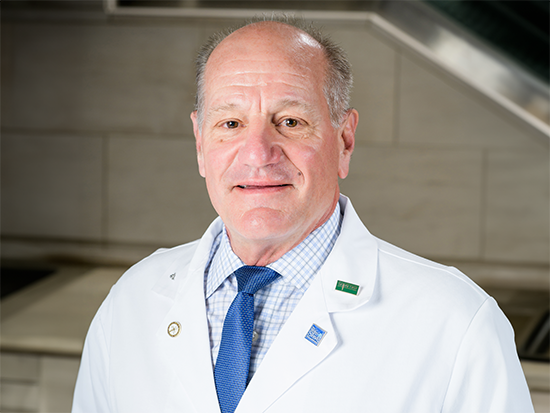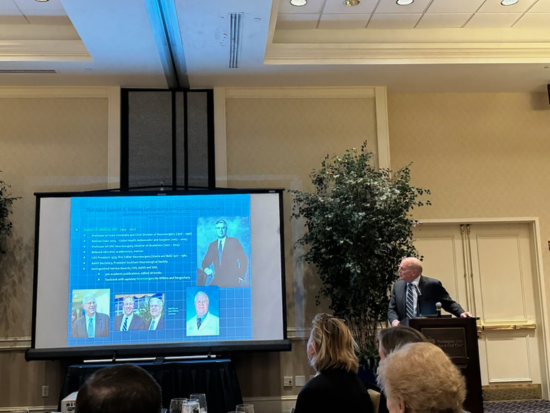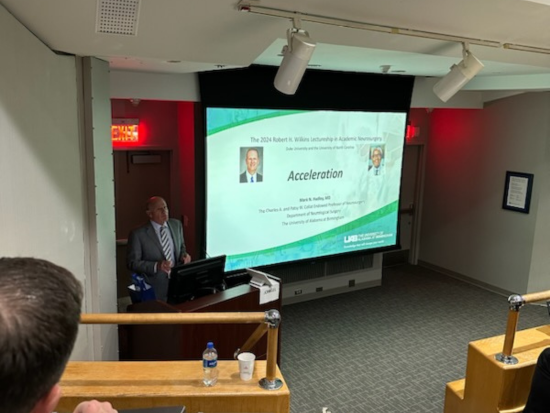 Mark N. Hadley, M.D., Charles A. and Patsy W. Collat Endowed Professor of Neurosurgery and Department of Neurosurgery professor, was selected to serve as the distinguished speaker at the annual Robert H. Wilkins, M.D., Lectureship in Academic Neurosurgery on Feb. 20 and 21, 2024.
Mark N. Hadley, M.D., Charles A. and Patsy W. Collat Endowed Professor of Neurosurgery and Department of Neurosurgery professor, was selected to serve as the distinguished speaker at the annual Robert H. Wilkins, M.D., Lectureship in Academic Neurosurgery on Feb. 20 and 21, 2024.
The two-day lectureship, sponsored jointly by the University of North Carolina at Chapel Hill (UNC) School of Medicine and Duke University School of Medicine Departments of Neurosurgery, was established in 2015 to honor the late Robert H. Wilkins, M.D., whose academic career included professorships at both institutions.

Following tradition, Hadley spent the first day of the lectureship at UNC meeting with neurosurgery faculty and residents. On the evening of Feb. 20, faculty, residents and alumni of UNC and Duke’s Departments of Neurosurgery, along with Hadley and Wilkins’s family, attended a gala to celebrate Wilkins’s legacy. Here Hadley delivered his first lecture, “Perfusion Pressure Management in Spinal Cord Surgery. A career pursuit in Academic Neurosurgery.”
The next morning, Hadley visited Duke University to meet with neurosurgery residents before presenting, “Acceleration,” at the Departments of Neurosurgery and Surgery Combined Grand Rounds. This lecture offered a look into Hadley’s academic career, exploring examples of challenges, perseverance, collaboration and leadership throughout his 40 years in medicine and neurosurgery. While at Duke, Hadley also met with members of the Department of Neurosurgery faculty.

"Dr. Wilkins was well known for his commitment to neurosurgical science and the art of patient care. He was an academician, an excellent educator, a mentor and role model,” said Hadley. “He was prolific as an academic neurosurgeon, publishing over 300 scientific articles and 28 books, including the definitive comprehensive neurosurgical textbook, a three-volume set entitled ‘Neurosurgery.’”
Hadley noted a similar leadership experience he shared with Wilkins, saying, “He [Wilkins] was a leader in organized neurosurgery. We had leadership in the Congress of Neurological Surgeons in common. Dr. Wilkins served as president of the organization in 1979. My term as CNS president followed years later in 2003.”
“Wilkins, with his wife, Gloria, was the first editor of the CNS journal, Neurosurgery,” said Hadley. “I knew and admired Bob and Gloria Wilkins through our CNS past-presidents’ responsibilities and social events. It is an honor to serve in this special role as the Robert H. Wilkins Lecturer in Academic Neurosurgery. It was a distinct pleasure to spend a memorable evening with Gloria Wilkins, her daughter and son-in-law as well.”
About Wilkins
Wilkins, who devoted his professional life to teaching and advancing neurosurgery, passed away on March 31, 2017.
As a Pittsburgh native, Wilkins earned both his undergraduate and medical degree from the University of Pittsburgh before completing his neurosurgical residency at Duke in 1968.
Following his residency, Wilkins joined the Duke faculty as an assistant professor of neurosurgery and as chief of neurosurgery at the Durham Veterans Affairs Hospital.
Wilkins was recruited to Texas in 1972, where he served at the Scott & White Clinic, the University of Texas Medical Branch in Galveston, and the Southwestern Medical School in Dallas, before accepting a role at his alma mater in 1975. After spending one year at the University of Pittsburgh, Wilkins returned to Duke until his retirement in 2004.
In retirement, Wilkins and his wife, Gloria, enjoyed traveling and spending time with their children, Michael, Jeffrey and Elizabeth (Betsy), and their grandchildren.
Wilkins also explored his passion for global health, traveling to Uganda with Duke’s Global Neurosurgery Program and providing neurosurgical care to under-served populations.
In 2012, Wilkins joined the faculty at UNC as director of academics and professor of neurosurgery.
Among his most impactful contributions to the field of neurosurgery was the establishment of the Congress of Neurological Surgeons’ professional journal, Neurosurgery in 1977.